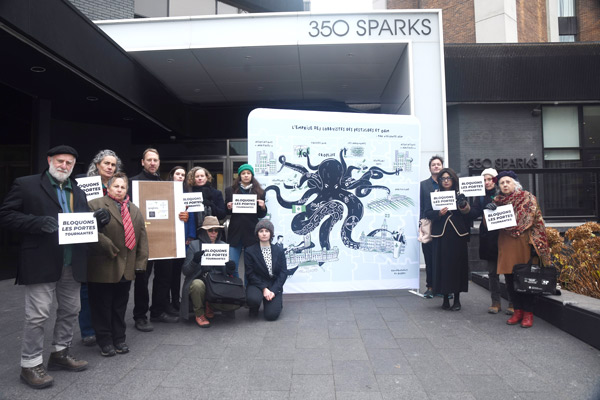
The lobbying practices of the pesticide and GMO industry in Canada revealed. By Claire Robinson and Jonathan Matthews
Six out of 11 key executives for Canada’s largest GMO and pesticides lobby group, CropLife Canada, previously held senior government positions with the country’s pesticide and food safety regulators for years, a new investigation has revealed.
The findings, reported by Quebec-based environmental group Vigilance OGM, follow investigations by Canada’s National Observer (CNO) and Radio-Canada that exposed how pesticide producers and federal officials closely collaborated to protect industry interests.
Among the key lobbyists highlighted in the report is Pierre Petelle, CropLife Canada’s President and CEO, who spent five years as a senior policy analyst with Canada’s Pest Management Regulatory Agency (PMRA) – an agency accused of being so completely captured by industry that it has adopted its goals of promoting pesticides and GMOs at the expense of scientific and regulatory integrity and the public interest.
From scandal to scandal
Tracking the industry’s lobbying practices exposes the extent of corporate capture in Canada, according to Thibault Rehn, Coordinator of Vigilance OGM. He told Canada’s National Observer, “We can no longer go from scandal to scandal without addressing the underlying and systemic issues”.
Those scandals include:
An October 2024 investigative report found that government regulators staved off a pesticide ban by helping Bayer undermine a study that shows high levels of neonicotinoid contamination in wetlands
In September 2023, documents received via Access to Information showed that CropLife Canada worked in a joint committee with federal government departments called the “Tiger Team” to remove government regulation, including government safety assessments, from many new GMOs. For more information see cban.ca/NoExemptions
In July 2023, Dr Bruce Lanphear, a physician and professor at Simon Fraser University in British Columbia, resigned from Health Canada’s Pesticide Management Regulatory Agency scientific advisory committee because of a lack of transparency in government decision-making over pesticide safety, and the lack of attention to independent scientific data.
Revolving door
Vigilance OGM has produced an animated map of lobbying with links to numerous explanatory pages in French that illustrate, in particular, the “revolving door” phenomenon and the privileged relationships between CropLife executives and public officials. Notably, key leadership positions at CropLife are held by former senior executives from Health Canada, the Canadian Food Inspection Agency, or Agriculture Canada.
 For instance, as well as CropLife Canada’s President and CEO coming from Health Canada’s Pest Management Regulatory Agency (PMRA), Emilie Bergeron, CropLife’s Vice President of chemistry spent 15 years as a deputy director for Agriculture and Agri-Food Canada, and Terri Stewart, CropLife Canada’s Executive Director of chemistry, spent 16 years with Health Canada, working on pesticide re-evaluations.
For instance, as well as CropLife Canada’s President and CEO coming from Health Canada’s Pest Management Regulatory Agency (PMRA), Emilie Bergeron, CropLife’s Vice President of chemistry spent 15 years as a deputy director for Agriculture and Agri-Food Canada, and Terri Stewart, CropLife Canada’s Executive Director of chemistry, spent 16 years with Health Canada, working on pesticide re-evaluations.
And it’s not just one-way traffic between government pesticide regulators and the industry they are supposedly regulating. Vigilance OGM also gives examples of people flowing out of Bayer Crop Science and CropLife America, the lobby group’s American arm, and into Health Canada and the Canadian Food Inspection Agency.
Industry’s relay stations
The explanatory map also highlights how the industry spreads its message by multiplying supportive voices. As CNO notes, Vigilance OGM’s analysis “shows how pro-pesticide messaging is amplified by organisations, public education initiatives and academics that have links to the pesticide industry. This includes close ties between six of Canada’s largest agricultural lobby groups and the pesticide lobby. For example, the Canadian Grains Council is presided over by CropLife President and CEO Pierre Petelle, while lobby group Soy Canada is largely funded by pesticide producers.”
The pesticide lobby’s influence also spreads via fake NGOs. Take, for instance, the Canadian Centre for Food Integrity (CCFI), whose mission is building public trust locally and globally in Canada’s food system. Although CCFI is registered as a “not-for-profit charitable organisation”, about two-thirds of its funding comes from members like Bayer, BASF, Syngenta and CropLife Canada, with the remainder coming from the Canadian government. When it comes to governance, BASF Canada’s former Head of Communications and Public Affairs, Nicole McAuley, sits on its board. McAuley is also a former member of the Government Affairs Committee at CropLife Canada and is currently Vice President of the PR firm AdFarm, which represents the GMO and pesticide producers Bayer, BASF, AgBiome and Nufarm, among others.
 Vigilance OGM also notes how, as public funding for higher education has shrunk, universities have become prime targets for private companies, which can exploit the high level of public trust university researchers enjoy. One of the examples Vigilance OGM gives is the University of Saskatchewan researcher Stuart Smyth. The industry sponsors of Smyth’s Saskatchewan Chair include Bayer, Syngenta and CropLife Canada, while the Chair’s mission statement commits Smyth to providing “the industry with research from a neutral perspective, but one that will hold industry interests as a priority”. That he succeeds in his mission is reflected in CropLife Canada’s annual report for 2020-21, which notes the award Smyth received from CropLife for “his exemplary efforts in mobilizing stakeholders for the benefit of the plant science [read: GMO] industry”.
Vigilance OGM also notes how, as public funding for higher education has shrunk, universities have become prime targets for private companies, which can exploit the high level of public trust university researchers enjoy. One of the examples Vigilance OGM gives is the University of Saskatchewan researcher Stuart Smyth. The industry sponsors of Smyth’s Saskatchewan Chair include Bayer, Syngenta and CropLife Canada, while the Chair’s mission statement commits Smyth to providing “the industry with research from a neutral perspective, but one that will hold industry interests as a priority”. That he succeeds in his mission is reflected in CropLife Canada’s annual report for 2020-21, which notes the award Smyth received from CropLife for “his exemplary efforts in mobilizing stakeholders for the benefit of the plant science [read: GMO] industry”.
Churning out approvals
While the reach of corporate lobbying into academia and civil society is disturbing, critics are clear, according to Canada’s National Observer, that the “biggest problems lie in the close relationship between federal regulators and pesticide manufacturers”.
Bruce P. Lanphear, a physician and professor of health sciences at Simon Fraser University, reflected on his time as co-chair of the science advisory committee at the Pesticide Management Advisory Council (Health Canada), from which he resigned in protest: “I witnessed the industry in action, influencing how the government regulates toxic chemicals. I remain baffled by our government’s inaction in the face of such influence. As an expert in toxic chemicals, I know that this complacency has and will continue to have significant consequences for the health of Canadians.”
And Mary Lou McDonald, founder, president and counsel of the Canadian NGO Safe Food Matters, told CNO in response to the recent findings, “The system needs to change. The pesticide regulator, as the decision-maker on pesticides, should not in any way work with those promoting pesticide use. It makes no sense, and the result is a regulator that keeps churning out pesticide and GMO approvals at the expense of Canadians’ health.”
Keeping the spotlight on lobbying
Vigilance OGM is calling on public decision-makers to closely monitor and regulate corporate lobbying to safeguard the public interest in matters of pesticides and GMOs.
On 28 November on Parliament Hill in Ottawa, the group unveiled an interactive map featuring a giant octopus with many arms, representing the reach of corporate lobbying to influence all stakeholders, through agronomists, agriculture associations, front groups and fake NGOs, seed and pesticide dealers, and the federal and provincial governments themselves.
While Vigilance OGM’s information is published in French, the Canadian Biotechnology Action Network (CBAN) has provided an English language summary. And a preliminary (non-interactive) English language summary of the map itself is available at www.cban.ca/CorporatePRmap.










